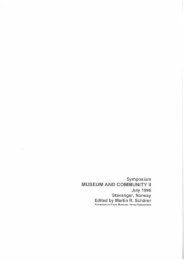Key Concepts of Museology - ICOM
Key Concepts of Museology - ICOM
Key Concepts of Museology - ICOM
Create successful ePaper yourself
Turn your PDF publications into a flip-book with our unique Google optimized e-Paper software.
and the people <strong>of</strong> the area in which<br />
it is located. The public museum is<br />
essentially the property <strong>of</strong> the people;<br />
it is fi nanced and administered by the<br />
people through its representatives<br />
and by delegation, through its management.<br />
This system is most strongly<br />
present in Latin countries: the public<br />
museum is essentially fi nanced by<br />
taxes, and its collections are part<br />
<strong>of</strong> the logic <strong>of</strong> public ownership (in<br />
principle they cannot rightfully be<br />
removed or deaccessioned, nor can<br />
their status be changed unless a strict<br />
procedure is followed). The working<br />
rules are generally those <strong>of</strong> public<br />
services, especially the principle <strong>of</strong><br />
continuity (the service is required to<br />
operate continuously and regularly,<br />
with no interruptions other than<br />
those provided for in the regulations),<br />
the principle <strong>of</strong> mutability (the<br />
service must adapt to changes in the<br />
needs <strong>of</strong> the general public interest,<br />
and there should be no legal obstacle<br />
to changes to be made to this end),<br />
the principle <strong>of</strong> equality (to insure<br />
that each citizen is treated equally).<br />
Finally the principle <strong>of</strong> transparency<br />
(communication <strong>of</strong> documents about<br />
the service to anyone who requests<br />
them, and the reasons for certain<br />
decisions) signifi es that the museal<br />
establishment is open to all and<br />
belongs to all; it is at the service <strong>of</strong><br />
society and its development.<br />
In Anglo-American law the prevailing<br />
notion is less that <strong>of</strong> public<br />
service than that <strong>of</strong> public trust,<br />
principles which demand that the<br />
trustees have a strict commitment to<br />
the museum, generally organised as a<br />
private enterprise with the status <strong>of</strong><br />
a non-pr<strong>of</strong>i t organisation, and that<br />
the activities <strong>of</strong> the board <strong>of</strong> trustees<br />
are aimed at a certain public. This<br />
museum’s main point <strong>of</strong> reference,<br />
particularly in the United States, is<br />
more an idea <strong>of</strong> community than that<br />
<strong>of</strong> public, the term community <strong>of</strong>ten<br />
being taken in a very wide sense (see<br />
Society).<br />
This principle <strong>of</strong> public interest<br />
causes museums worldwide to see<br />
their activities carried out, if not<br />
under the aegis <strong>of</strong> public authorities,<br />
then at least with reference to<br />
them, and most <strong>of</strong>ten to be partly<br />
run by these authorities, which in<br />
turn obliges museums to respect<br />
a number <strong>of</strong> rules which infl uence<br />
their administration and a number<br />
<strong>of</strong> ethical principles. In this context<br />
the question <strong>of</strong> the private museum<br />
and that <strong>of</strong> the museum managed as<br />
a commercial enterprise allows the<br />
assumption that the different principles<br />
connected with state ownership<br />
and the nature <strong>of</strong> public authorities<br />
mentioned above would not be<br />
encountered. It is from this perspective<br />
that the <strong>ICOM</strong> defi nition <strong>of</strong><br />
museum presupposes that it is a nonpr<strong>of</strong>i<br />
t organisation, and that many <strong>of</strong><br />
the articles <strong>of</strong> its code <strong>of</strong> ethics have<br />
been drafted according to its public<br />
nature.<br />
2. As a noun the word ‘public’ refers<br />
to the museum users (the museum<br />
public), but also, by extension from<br />
its actual user public, to the whole<br />
<strong>of</strong> the population addressed by the<br />
71
















